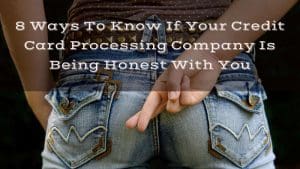
What do you think is fair to be able to expect from a credit card processing company? Do you have any expectations when that sales rep that walks in the door of your business?
If you’re anything like most business owners, you don’t think much about it at all. When I was first tasked with figuring out how to process credit cards for my business, I just did a simple online search to find a provider that could make it happen. I started by looking at a few of the names I had heard of before and then the rates started to appear. Ouch.
Here I am a couple of years later, and I have the privilege of writing articles for a credit card processing company I believe in. I know more today than I knew when I signed up with my first credit card processing company. Let’s save you from the headaches that I experienced when I was first looking.
I thought all merchant service companies were the same. Having my own business was new to me, and I just didn’t know what I didn’t know. It turns out that I would pay for that quite handsomely over the next couple of years.


Table of Contents
ToggleIs Your Credit Card Processing Company Honest?
This is why I created this list of things you should expect from your credit card processing company. If you’re with a processing partner who doesn’t offer the following, you can do better. It’s time for you to find a better business partner in the merchant services area.
It seems to me that this should be a given, but it’s rarely the case in my experience. I’ve had companies hide fees on me, change rates after they were “locked in” and more. I expect a processing company to tell me what the fees are going to be and stand by their word. I don’t have time to micromanage my processing account each month. It turns out that’s actually what most merchant account companies count on.
They bank on the fact that most business owners won’t check their statement regularly. This is where they begin to change things after a few months of processing. If you’re dealing with a service company that won’t be honest with you, why? it’s time to find one who will.
Look for guarantees, rates that truly lock in on the day you sign and won’t change. Look for money back options and make sure there isn’t an exit clause in your contract. The best credit card processing companies shouldn’t have to force you to process with them.
Holding you in an annual contract for 3 or 4 years should be a red flag. If they have to make you sign a contract to work with them, there’s probably a reason. Most likely it’s because most of their clients want to leave earlier than 3 years, and that’s just not a good sign.
Find a company where you can work with month-to-month contracts. With a monthly contract, your processor can’t monkey around with your rates. If they do, you can leave. That’s the kind of processor you’re looking for.


#1 – Straightforward Pricing Structure
One thing you should look for in a new merchant services company is a crystal clear pricing structure. If you’re looking at a provider and you can’t understand their pricing, keep looking. Pricing structures that are unclear are not in favor of the small business owner.
Here’s what you should be able to expect to know before you sign a contract.
- What is their pricing for qualified cards? This is most often the only pricing structure that you will get from a company. This is not the end all though, you need to know more than just their pricing % for qualified cards. Did you know that most of the cards that you will likely process aren’t going to be of the qualified type? Any card with a rewards program like cash back or airline miles aren’t qualified cards.
- What is their pricing for mid-qualified cards?
- What is their pricing for unqualified cards? This is a very important number to understand when you sign with a merchant processor. Unqualified cards make up most of the credit cards that you are going to process. Many un-reputable processors will hide that this rate even exists. They’ll charge you a different rate for unqualified cards. You’ll find that the rate they initially quote you isn’t the rate you’re getting. When you find that out, you’re already locked into a long term contract and there’s nothing you can do about it. It’s hidden in the small print of the contract and you’re stuck.
- What is their pricing for debit cards? Debit card pricing is completely different than credit card pricing. Do you ever see a rate quoted where a company says that they can get you rates of 0.05%? Seems crazy low, right? It’s actually truthful because the cost to process a regulated debit card is 0.05% . If that is the rate that they quote you for everything, they’re hiding something. The cost on credit cards is around 1.5% at least per transaction. 0.05% rates don’t exist anywhere outside of the debit card. This is a powerful thing to know when talking with a processor on the phone.


#2 – No Contract Structure
When selecting from a list of top credit card processing companies, look for one that doesn’t have any kind of annual contract. I can’t tell you how many friends of mine have signed a 3 or 4 year contract without knowing it. The rep promised them the world, but most of it turned out to be skewed versions of half truths.
There are credit card processing companies that do month to month pricing. These are the ones that you want to work with. You of course will need to check all the other things on this list as well.
Annual contracts are a complete load of garbage. If the credit card processor you’re talking with can’t offer you month to month processing, it’s time to move on.


#3 – Positive Social Proof
When selecting a processor, remember that you’re essentially selecting a business partner. This is the company that you’re going to be trusting with all your merchant transactions. You want them to be reputable.
There are many ways to check if a company is above board, but one great way is to check their social proof. Check their company website for reviews from actual customers that you can prove exist. Don’t just read the comments that are supposedly from customers on the site. Check for actual clients that you can track down and prove are real and said those things. Here are a few great places to look for actual social proof.
- Google Business Listing – If you do a google search, they should have a Google business listing. Attached to that business listing should be many reviews from their customers. Do they have at least 5 reviews in a row that are positive? If not, there are many other credit card processors and it’s time to move on.
- Bing Reviews – Like Google above, this is how the business reads through Bing’s listings. Check to see what actual clients are saying about the company. Look to prove that they exist and aren’t just friends posting to boost a friends business account.
- Yelp – If you’ve spent any time on Yelp.com, you’ve seen that it’s a review machine. People are constantly posting on Yelp about their experiences with companies across the globe. The company you’re looking into should be on there. Check to see what people are saying and make sure that they’re legitimate.
- Better Business Bureau – The BBB keeps records of complaints about each business and gives them a rating. If the BBB sticker is on their website, click it. You should go to the BBB site to verify what they’re saying their rating is. If you can’t click on the sticker on their website, it’s fake 99% of the time. Anyone can grab a picture of a BBB A+ rating and stick it on their website. Only the real business with an A+ rating can show a sticker on their website and then have it prove itself by showing you on the BBB website. If you see a sticker you can’t click on, check them on it. It might just be a fake.
If the above check out, you’re looking at a company that is worth having a further discussion with. Remember, it’s not just one of these areas that makes a great processing company. It’s a combination of them all, and believe it or not, they’re out there.


#4 – Amazing Customer Service
Customer service isn’t always the first thing we think about when we sign up for a service. We often want to talk price and options first and assume customer service later. When it comes to merchant processing, it pays to check this out first.
Almost every call that comes in to Dual Payments wants to talk low rates. Hardly any of these business owners ever ask about customer service. They focus on rates and contracts and just assume that our customer service is good.
Credit Card Processing isn’t a set it and forget it industry. You need a merchant provider that engages in your daily sales process helping you watch for red flags. When you have a billing question, do you speak to someone who knows the business? Do you get routed to a call center overseas? Is it possible to talk to the sales rep that signed you up for service? Do you have a dedicated customer support representative?
Before you get started, it’s important to know what happens after the ink on the contract has dried. (Which, see above… No contracts, remember?) Find out who you would talk with should you have a question about your account. What will happen when a chargeback occurs?
They should be able to tell you exactly what will happen when you call and who you’re going to talk to. Don’t settle for an overseas call center. Don’t sign with a business that only keeps office hours and doesn’t have an after hours support line.


#5 – Chargeback Support
When it comes to customer support, the chargeback is a perfect litmus test. A chargeback is when a customer disputes a charge that your business has placed on their credit card.
For example, imagine that a customer has one of your service people out to repair an air conditioner. The trip charge and parts for that particular charge came to $379 and the customer put it on his charge card.
That customer has up to two years to initiate a chargeback. (Timeframe depends on the card issuing bank.) This is where they basically say that they didn’t authorize this charge. They are telling their credit card provider that they refuse to pay the fee. Now it’s up to you the business owner to prove that the customer authorized the charge and signed for it. Keeping great records as a business can really help here, but so can having your merchant processor in your corner.
If you have a great credit card processing company, you will have an advocate in your corner. You want someone that you can call up on the phone and have conversations with about how to handle a chargeback. A good processor will help you know exactly what you need to do.
There is a limited window where a business can reply to the chargeback. It’s important that you know what to do and when. With such a limited window, you want someone who is going to be monitoring things on the back end that can help you be proactive.


#6 – Reasonable Equipment Costs
One question you should always ask when looking for a new merchant account is how much the equipment will be. There are no standard costs for processing equipment. If you’re charged more than $400 for a terminal, you’re most likely paying too much.
There are some terminals that can cost your merchant services provider around $200 each. If you’re getting one of the less expensive terminals, you shouldn’t be paying $400 or more.
If you’re looking into a point of sale system through your merchant processing company, it brings a new set of questions. Ask if there are any monthly module fees that go along with it.
For example, I know that the Clover system is a little less expensive than other solutions. Their point of sale modules are about $60 per month per module though. It’s not hard at all to rack up a $100 – $150 per month module fee. This makes the Clover system one of the more expensive options out there.
Remember that it’s not all about the lowest priced system, but rather all about the total cost. When it’s all said and done, how much will you pay per year?
If you’re working with a credit card processing company that offers free equipment, look into it. Some merchant processors want to work with you badly enough that they will take care of the cost of the terminal or point of sale system for you.
Know that they are going to end up paying for that terminal or POS system over the life of your account. You can expect a little higher rate or some type of fees to make up the difference. This is a way that you can include the cost of your processing equipment in the small fee that your merchant provider gets from your transactions.
Is a terminal lease a good option? The blanket answer is no, but I do know of one exception. If you’re looking at a terminal that is a regular old terminal that accepts credit and debit cards along with near-field payments, you shouldn’t be wrapped up into a lease. If you’re looking into a terminal that is equipped with a convenience fee calculator built in, they’re usually more expensive and a lease can be a much more effective option to keep from having to shell out a lot of money at once.


#7 – Supports all card companies on one statement
If you’ve been in business for 2 or 3 years, you’ve probably been getting multiple statements. (Most likely Visa and MasterCard in a combined statement and American Express in a separate statement.) This doesn’t have to be the way it is any longer. It is possible now for everything to come in a unified statement to simplify your bookkeeping.
American Express has created a new service called OptBlue. Hopefully your preferred credit card processing company is taking advantage of this. OptBlue allows all your credit card fees to be sent to you on one statement. Your credit card services provider just sends one piece of paper per month.
What used to be multiple statements for each card provider is now one. If you’ve never gotten separate statements, this is a big deal.
Make sure that any company you use offers OptBlue from American Express. There’s no reason to have separate statements from American Express.
Opt Blue also comes with a lower rate for accepting American Express cards. Who doesn’t like lower rates?!


Conclusion:
There are great credit card processing companies available to the small business owner today. Whoever you decide to use, make sure that you run them through this list before you sign on the dotted line.
If they can’t do any of the above, ask them why. If their answer isn’t convincing, move on to another provider. There’s no reason to settle for a less than stellar relationship with your merchant services company. You deserve a great credit card processing company. Put your choice through the ringer and make sure you come out with the best merchant services provider for your business.










